ABPS Diplomate Sarah Gilbert, MD, on the Value of BCEM Certification in Emergency Medicine
 Earning certification with the Board of Certification in Emergency Medicine (BCEM), has undoubtedly helped me prove my knowledge and skills to employers and colleagues. For instance, in the hospital system where I am currently employed (which is comprised of a main urban hospital and a critical access hospital), physicians must be board certified to hold staff privileges in the emergency room. Prior to the hospital’s current administration, physicians trained in family practice or internal medicine, but those who were not board certified in EM could work in the emergency department. Every ED physician was given the chance to sit for the ER boards. However, family practice and internal medicine physicians who were certified by the ABMS in their respective specialties did not qualify to sit for the AOBEM or ABEM boards mid-career. They did qualify for the BCEM boards; they all sat for the exams, passed and thus became board certified. As a result, they continue to practice EM in our organization.
Earning certification with the Board of Certification in Emergency Medicine (BCEM), has undoubtedly helped me prove my knowledge and skills to employers and colleagues. For instance, in the hospital system where I am currently employed (which is comprised of a main urban hospital and a critical access hospital), physicians must be board certified to hold staff privileges in the emergency room. Prior to the hospital’s current administration, physicians trained in family practice or internal medicine, but those who were not board certified in EM could work in the emergency department. Every ED physician was given the chance to sit for the ER boards. However, family practice and internal medicine physicians who were certified by the ABMS in their respective specialties did not qualify to sit for the AOBEM or ABEM boards mid-career. They did qualify for the BCEM boards; they all sat for the exams, passed and thus became board certified. As a result, they continue to practice EM in our organization.
All of the EM doctors at our facility are now board-certified by either the ABEM or the BCEM. Our administration compensates, treats, and respects all of us equally and actively recruits new physicians who are certified by any of the major EM boards in the United States.
For my initial certification, I sat through a weeklong intensive EM review course. For my recertification exams, since I have been an active participant in the BCEM and in its exam development, I continually reviewed new material and our major EM texts—Tintinalli’s Emergency Medicine Manual and Rosen’s Emergency Medicine: Concepts and Clinical Practice. Serving on exam development committees, which we encourage our Diplomats to do, is a wonderful way to renew knowledge and stay updated. I also listened to the tapes from EM Boot Camp, which is an incredibly comprehensive emergency medicine review course.
Unfortunately, in some parts of the country, the BCEM is regarded as a second-class citizen, and not being residency trained in emergency medicine disqualifies me from employment in major urban areas and in tertiary care teaching hospitals. However, in the nation’s heartland and in rural areas where there are not enough residency trained EM physicians to fill the available ER positions, there is a much greater appreciation for the BCEM. Physicians certified by the BCEM have been trained primarily in one specialty but have additional training in EM. Given our competency, experience, and knowledge, BCEM-certified physicians deserve to have a high rate of acceptance and administrative appreciation. In the areas where this is indeed true, it allows us to serve the health care needs of the public in emergency rooms in our country.
BCEM certification is an investment in my career and my future. I have stayed active in the BCEM for over 20 years because I wholeheartedly believe in what this board is trying to accomplish—to bring well-educated, well-trained, and competent emergency medicine physicians into the nation’s emergency rooms. As a doctor who originally trained in surgery and then switched to emergency medicine, I would not have enjoyed such a long career in emergency medicine had it not been for the BCEM.






